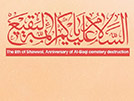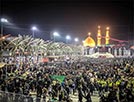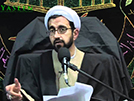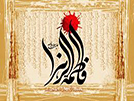Verse59
- Details
- Hits: 2262
(59) يَا أَيُّهَا الَّذِينَ آمَنُواْ أَطِيعُواْ اللّهَ وَأَطِيعُواْ الرَّسُولَ وَأُوْلِي الأَمْرِ مِنكُمْ فَإِن تَنَازَعْتُمْ فِي
شَيْءٍ فَرُدُّوهُ إِلَى اللّهِ وَالرَّسُولِ إِن كُنتُمْ تُؤْمِنُونَ بِاللّهِ وَالْيَوْمِ الآخِرِ ذَلِكَ خَيْرٌ وَأَحْسَنُ تَأْوِيلاً
59. " O' you who have Faith! Obey Allah and obey the Messenger and those charged with authority among you. Then, if you quarrel about anything, refer it to Allah and the Messenger, if you believe in Allah and the Last Day. This is better and very good in the end."
Commentary:
This verse, together with a few verses next to it, discuss about one of the most important matters of Islam, that is, the subject of leadership. They determine the true source of imitation of Muslims for the different social and religious affairs that they may have. At first, it commands those who have faith, saying:
" O' you who have Faith! obey Allah..."
It is obvious that, for a believing person, all obediences must be led to the obedience of Allah. Then, any form of leadership must originate from His pure Essence and be adopted to His command, because it is He Who is the Ruler and the genetic Owner of the world of existence, and every sovereignty and ownership should be under His command.
For the second stage it says:
"... and obey the Messenger ..."
Obey the Prophet who is immaculate and never speaks out of desire (1), an Apostle appointed from the side of Allah amongst people, whose word is the word of Allah, and whose rank and position have been bestowed to him by Allah.
And, for the third stage, it says:
"... and those charged with authority among you..."
Obey such ones who are from the inside of the Islamic society and protect both the divine religion and worldly affairs of people.
After that, it says:
"... Then, if you quarrel about anything, refer it to Allah and the Messenger, if you believe in Allah and the Last Day. This is better and very good in the end."
Who are ' Those Charged with Authority '?
All the Shi'ite commentators have the same attitude on this matter that the purpose of the phrase /'ulil- 'amr /, mentioned in this verse, is the immaculate Imams to whom the physical and spiritual leadership of the Islamic society, consisting of all affairs of life, have been given from the side of Allah and His Apostle (p.b.u.h.), and it does not conclude any other than them. This meaning is said according to the contents of 33 authentic traditions cited in At-Tafsir-ul-Burhan, vol.1, pp. 381-386 (second edition).
Of course, under some conditions, the obedience of those who are appointed to a rank and charge a position in the society, is necessary. This obedience is not for that they themselves are 'those charged with authority', but for that they are agents of 'those charged with authority'.
Explanations:
1. Absolute obedience from the Messenger of Allah and 'those charged with authority' is a token for inerrancy of those magnanimous ones. Thus, any denotation expansion which is stated for 'those charged with authority' is not valid, if the one is not infallible.
2. The repetition of the word /'ati'u / 'obey' is the secret of the kind of orders. The holy Prophet (p.b.u.h.) sometimes stated the ordinances of Allah, and sometimes gave the governmental commands, since he had both offices of 'prophecy' and government.(2)
3. The name of 'those charged with authority' is mentioned nesct to the names of Allah and the Apostle, accompanied with an absolute obedience. This is a sign to show that the one in charge of Islamic government should be qualified with a high saintliness. Based on many traditions, as was mentioned in the commentary of the verse, the purpose of the phrase 'those charged with authority' is Ahlul-Bayt (a.s.).
4. People ought to accept the Islamic system and support its godly leaders by their words and deeds.
"... Obey Allah and obey, the Messenger and those charged with autority among you ..."
5. In obedience, hierarchical order should be observed, that is: Allah, the Messenger, and those charged with authority.
6. One of the ways of: acknowledgement is comparison with opposites and contraries.
7. When speaking of mischief-makers, the extravagant, the misguided, the ignoranty the tyrants and so on, the Qur'an's command is: " Do not Yield..." and " Do not follow ...". The conclusion is that the aspects of the word /'ati'u/ 'obey' must be those whose obedience have not been prohibited of.
8. To obey false deities is forbidden.
9. If all groups assume the Qur'an and the practice of the Prophet (p.b.u.h) as reliable testimonies, discords will be removed and unity will govern.
10. A complete religion must have a solution for discords. The Qur'an says:
"... refer it to Allah and the Messenger, ..."
11. Those who are opponent to the orders of Allah, the Messenger, and 'those charged with authority' should doubt in their own religion, if they want to believe in truth.
"... if you believe ..."
12. Farsightedness and being careful of the interests of long future time is the standard of value.
"... This is better and very good in the end."
(1) Sura An-Najm, No. 53, Verse 3.
(2) Allah addresses the Prophet (p.b.u.h.) in the Qur'an both for the rank of statement (Sura An-Nahl, No. 16, Verse 44) and for the rank of government (Sura An-Nisa', No. 4, Verse 105).











